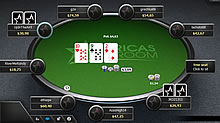Millions of people play poker around the world, and the game continues to grow every year, as more states legalize table games and online sites. Poker has truly become the world's favorite pastime. Here are some basic strategy tips to get your poker career started off on the right foot.
Be a Nerd
Great poker players are not born overnight, even those that do have a "natural talent" for the game work hard, both in table hours and study time. Even big time pros, like Daniel Negreanu paid his dues grinding the illegal cash games of Toronto before he became a famous tournament pro. It was harder to be a professional back then, there was no online poker, and the massive assortment of tools to improve was not available to players back then as it is now.
New players today have hundreds of books, poker forums, software, and even hands on coaching from top players. Becoming a "poker nerd" is the best way to evaluate your game effectively and improve. Great players examine their games, post hands, read books, and go above and beyond to improve. Go over your hand histories, and give yourself check ups. Post your hands in a poker forum, or chat with other knowledgeable players. Read every poker book you can get your hands on.
Stay Rolled
Another massive factor especially for aspiring professional players is bankroll management. Many extremely talented players still make enormous bankroll management mistakes that leave them penniless. Keeping a proper bankroll is imperative to success as a poker player.
Variance, or short term luck, can ruin a poker player's roll after a few unlucky sessions. Also, it is much harder mentally to play your A game, when you are playing on a short bankroll. Even if you think this will not affect you, it can bleed into your play. Playing on a short roll is one of the hardest things to do in poker.
If you are losing at your current limit, or having a rough few weeks, there is absolutely no shame in dropping down. Every poker player will have to rebuild at least once in their career, try to avoid doing it multiple times.
Bluff
It is essential early on to introduce bluffing, and especially semi bluffing into your game. This does not mean attacking every pot with guns blazing. It means thinking about your opponents and visualizing what they may be holding. Bluffing is really the art of guessing your opponent's ranges. You will rarely pinpoint your opponent's hand exactly, but the idea is to think of several hands he MAY have.
Semi-bluffing, betting with a draw, such as a flush draw or a straight draw is especially valuable. Many times, you will often be ahead in these situations (your opponent may have a weaker draw), or force your opponent to fold. Fold equity, is the likelihood of your opponent folding, and your stake gained if he does fold. Making your opponents fold when you have a worse hand is a large part of adding to your profits in poker.
Equilibrium
Unlike other jobs or situations in life, poker can be a game of emotions. Playing when you are upset or depressed can translate into your game. If you are having a horrible day, or are in the middle of a fight with your girlfriend or spouse, it is okay to just get up for a break or not play for the day.
The same goes for tilt if you are clearly off your game and down a good amount. It might just be best to call a quits for the day, even if the game you are playing in is exceptional. Many players are obsessed with the concept of getting even for the session and recouping their losses. This line of thinking is severely flawed. You should be playing based your opponents and your hand, not the thought of making back your losses. Remember though, every poker hand is part of one big long session, and the luck evens out in the end.
Plan Your Hand
In poker, you have to look at what you can and can not control. We can not control what cards we are dealt, or if we will get hit with a bad beat on the river. However, we can control how we react to certain situations. Often times, players will go into a hand and somehow commit their stack of chips in a crazy situation because they simply did not have a plan of how to react.
Planning out how you will play a certain player, in a certain situation will protect you from making colossal mistakes, and maximize your ability to capitalize on your opponent's miscues. How will you react if your opponent raises the turn? How will you react if your opponent calls? Thinking about the possible outcomes better prepares yourself for later streets, and keeps you from not being rational in your approach to the game. Of course, learning the most you can about your opponents helps you do this, so take notes, and truly get into the heads of the other players at your table.
Position! Position! Position!
Position is probably the most decisive factor in whether to play a hand preflop or not. Beginning players will want to take specific note of where they are in relation to the action. Positional awareness is simply gigantic! As a newer player, you will want to stay out of spots that may force you into a bad mistake, and playing out of position certainly gets you into weird spots.
Seat selection, seems like a lost art these days but is an extremely valuable tool. Sit to the left of the fish to isolate them with raises, and avoid sitting to the right of other professional type players that will do the same. Your chosen seat may be a large factor in how many hands you can play, which can cut into your profits.




